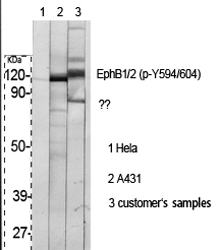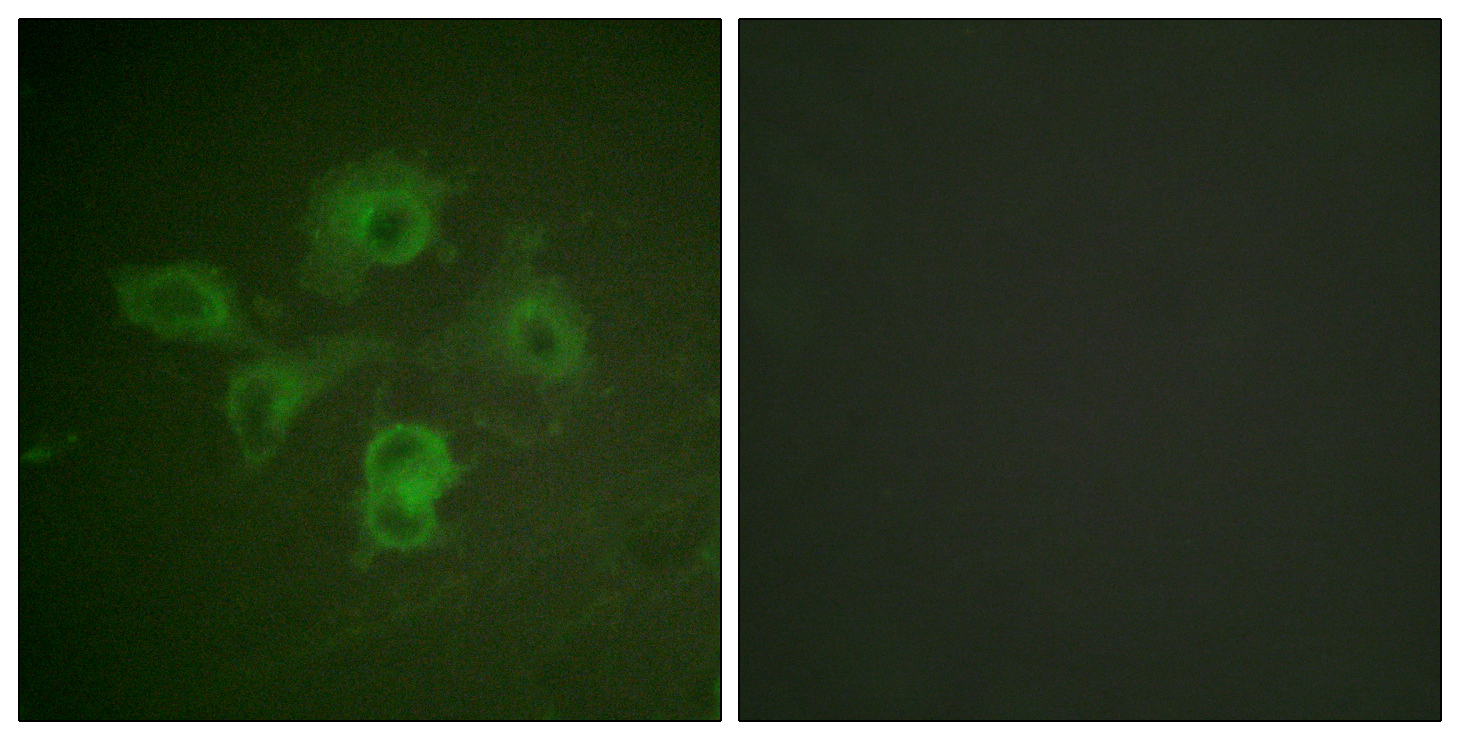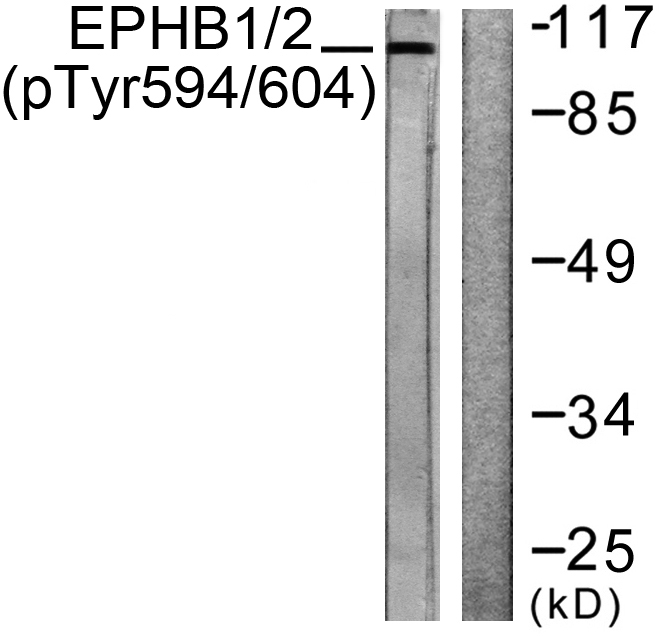EphB1/2 (phospho Tyr594/604) Polyclonal Antibody
- Catalog No.:YP0551
- Applications:WB;IF;ELISA
- Reactivity:Human;Mouse;Rat
- Target:
- EphB1/2
- Fields:
- >>Axon guidance
- Gene Name:
- EPHB1/EPHB2
- Protein Name:
- Ephrin type-B receptor 1/2
- Human Gene Id:
- 2047/1969
- Human Swiss Prot No:
- P54762/P29323
- Mouse Gene Id:
- 270190
- Rat Gene Id:
- 24338
- Rat Swiss Prot No:
- P09759
- Immunogen:
- The antiserum was produced against synthesized peptide derived from human EPHB1/2 around the phosphorylation site of Tyr594/604. AA range:561-610
- Specificity:
- Phospho-EphB1/2 (Y594/604) Polyclonal Antibody detects endogenous levels of EphB1/2 protein only when phosphorylated at Y594/604.
- Formulation:
- Liquid in PBS containing 50% glycerol, 0.5% BSA and 0.02% sodium azide.
- Source:
- Polyclonal, Rabbit,IgG
- Dilution:
- WB 1:500 - 1:2000. IF 1:200 - 1:1000. ELISA: 1:5000. Not yet tested in other applications.
- Purification:
- The antibody was affinity-purified from rabbit antiserum by affinity-chromatography using epitope-specific immunogen.
- Concentration:
- 1 mg/ml
- Storage Stability:
- -15°C to -25°C/1 year(Do not lower than -25°C)
- Other Name:
- EPHB1;ELK;EPHT2;HEK6;NET;Ephrin type-B receptor 1;ELK;EPH tyrosine kinase 2;EPH-like kinase 6;EK6;hEK6;Neuronally-expressed EPH-related tyrosine kinase;NET;Tyrosine-protein kinase receptor EPH-2;EPHB2;DRT;EPHT3;EPTH3;ERK;
- Observed Band(KD):
- 110kD
- Background:
- Ephrin receptors and their ligands, the ephrins, mediate numerous developmental processes, particularly in the nervous system. Based on their structures and sequence relationships, ephrins are divided into the ephrin-A (EFNA) class, which are anchored to the membrane by a glycosylphosphatidylinositol linkage, and the ephrin-B (EFNB) class, which are transmembrane proteins. The Eph family of receptors are divided into 2 groups based on the similarity of their extracellular domain sequences and their affinities for binding ephrin-A and ephrin-B ligands. Ephrin receptors make up the largest subgroup of the receptor tyrosine kinase (RTK) family. The protein encoded by this gene is a receptor for ephrin-B family members. [provided by RefSeq, Jul 2008],
- Function:
- catalytic activity:ATP + a [protein]-L-tyrosine = ADP + a [protein]-L-tyrosine phosphate.,function:Receptor for members of the ephrin-B family. Binds to ephrin-B1, -B2 and -B3. May be involved in cell-cell interactions in the nervous system.,similarity:Belongs to the protein kinase superfamily. Tyr protein kinase family. Ephrin receptor subfamily.,similarity:Contains 1 protein kinase domain.,similarity:Contains 1 SAM (sterile alpha motif) domain.,similarity:Contains 2 fibronectin type-III domains.,subunit:The ligand-activated form interacts with GRB2, GRB10 and NCK through their respective SH2 domains. The GRB10 SH2 domain binds EPHB1 through Tyr-928, while GRB2 binds residues within the catalytic domain. Interacts with EPHB6. The NCK SH2 domain binds EPHB1 through Tyr-594. Interacts with PRKCABP.,tissue specificity:Preferentially expressed in brain.,
- Subcellular Location:
- Cell membrane ; Single-pass type I membrane protein . Early endosome membrane . Cell projection, dendrite .
- Expression:
- Preferentially expressed in brain.
- June 19-2018
- WESTERN IMMUNOBLOTTING PROTOCOL
- June 19-2018
- IMMUNOHISTOCHEMISTRY-PARAFFIN PROTOCOL
- June 19-2018
- IMMUNOFLUORESCENCE PROTOCOL
- September 08-2020
- FLOW-CYTOMEYRT-PROTOCOL
- May 20-2022
- Cell-Based ELISA│解您多样本WB检测之困扰
- July 13-2018
- CELL-BASED-ELISA-PROTOCOL-FOR-ACETYL-PROTEIN
- July 13-2018
- CELL-BASED-ELISA-PROTOCOL-FOR-PHOSPHO-PROTEIN
- July 13-2018
- Antibody-FAQs
- Products Images

- Western Blot analysis of various cells using Phospho-EphB1/2 (Y594/604) Polyclonal Antibody
.jpg)
- Western Blot analysis of Hela cells using Phospho-EphB1/2 (Y594/604) Polyclonal Antibody

- Immunofluorescence analysis of HUVEC cells, using EPHB1/2 (Phospho-Tyr594/604) Antibody. The picture on the right is blocked with the phospho peptide.

- Western blot analysis of lysates from HepG2 cells, using EPHB1/2 (Phospho-Tyr594/604) Antibody. The lane on the right is blocked with the phospho peptide.



